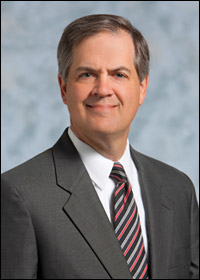TRIAL TECHNIQUES: The Ten Commandments of cross-examination, revisited
By: WISCONSIN LAW JOURNAL STAFF//March 23, 2011//
TRIAL TECHNIQUES: The Ten Commandments of cross-examination, revisited
By: WISCONSIN LAW JOURNAL STAFF//March 23, 2011//

By Richard H. Willis
Trial Techniques
Here’s a question that separates those who went to Sunday school from those who didn’t: What is the Fourth Commandment?
Don’t reach for your Bible. The answer is: “Remember the Sabbath day, and keep it holy.”
What day is the Sabbath? It isn’t Sunday. It is the seventh day — Saturday — the day the Lord rested in the creation story.
Sunday replaced Saturday as the official Christian day of rest and worship in the first century A.D., at the behest of Saint Ignatius.
So even the Ten Commandments can change a little over time.
The same applies to the “Ten Commandments of Cross-Examination.” In 1975, Irving Younger, then a professor at Cornell Law School after a career as a prosecutor and judge, created the list that became a core requirement for every trial lawyer.
Now, it’s time to take a critical look at his Ten Commandments, and like St. Ignatius did, tweak them a bit.
- * Be brief. Still good advice for the typical cross-examination, but what about the expert witness who has taken three hours to destroy your case? Making three points and sitting down is going to get you fired. Let’s couple “be brief” with “if possible.”
- * Use plain words. You don’t have to dumb down your cross but omit the impressive words used only to show you know as much as the witness.
- Ask only leading questions. True, but after 20 consecutive questions beginning with the phrase, “Isn’t it correct that …,” you are going to sound like an overbearing FBI agent.
- Be prepared. Know what the witness is going to say. How? You must develop the habit of taking “trial ready” depositions. Don’t go into a deposition assuming the case is going to settle. You won’t ask the hard questions and you won’t find out everything you need to know.
- Listen. For Professor Younger, this commandment was about getting over stage fright. Don’t write out your cross in a Q&A format. Instead, try bullet points or an outline. When you are freed from your notes, you will pick your head up and start looking at the witness.
- Do not quarrel. Often you run into witnesses who are so evasive or absurd in their efforts to obfuscate they won’t even agree it is cold in Milwaukee in the winter. The jury isn’t stupid, and neither are you. Don’t ask that extra question: “How can you possibly say that?” That gives the witness a chance to explain away a foolish answer.
- Avoid repetition. Younger’s point was not to let the witness repeat the story given on direct. Is repetition ever a good thing? Yes, when you are repeating a question to get an answer the witness has dodged. Simply repeat the question, shortening it by a word or two each time, and hone in until the witness gives the inescapable response. It is an effective technique when used sparingly.
- Disallow witness explanation. If your question permits an explanation, the question is probably too long. Don’t give the witness anything to have to explain.
- Limit questioning. Younger wanted to avoid at all costs asking one question too many, usually a conclusion you want the witness to agree with. I agree, but sometimes asking one question too many can highlight the issue in dispute or set up a direct examination later, when you have more control.
- Save it for summation. Younger urges saving conclusions for the closing. I prefer a variant of this: know when to stop. Most of the time, you should stop your cross when you have discredited the witness or drawn out an important concession. Unfortunately, you are going to sometimes find yourself stopping after realizing that you are getting killed.
These tips take some of the risk out of cross-examination, but not all of it. That’s the way it’s supposed to be. The courtroom can be a dangerous place.
Richard H. Willis is a partner in Bowman and Brooke’s litigation practice in the firm’s Columbia office. His practice is focused on commercial litigation and the defense of product liability and environmental claims nationwide. Willis is also an adjunct professor at the University of South Carolina, where he teaches trial advocacy.
Legal News
- Waukesha man sentenced to 30 years for Sex Trafficking
- 12-year-old shot in Milwaukee Wednesday with ‘serious injuries’
- Milwaukee man convicted of laundering proceeds of business email compromise fraud schemes
- Giuliani, Meadows among 18 indicted in Arizona fake electors case
- Some State Bar diversity participants walk away from program
- Wisconsin court issues arrest warrant ‘in error’ for Minocqua Brewing owner
- Iranian nationals charged cyber campaign targeting U.S. Companies
- Facing mostly white juries, are Milwaukee County defendants of color truly judged by their peers?
- Milwaukee Mayor speaks in D.C. Tuesday at White House water summit
- Chicago man sentenced to prison after being caught with ‘Trump Gun’
- FTC bans non-competes
- Gov. Evers seeks applicants for Dane County Circuit Court
WLJ People
- Power 30 Personal Injury Attorneys – Russell Nicolet
- Power 30 Personal Injury Attorneys – Benjamin Nicolet
- Power 30 Personal Injury Attorneys – Dustin T. Woehl
- Power 30 Personal Injury Attorneys – Katherine Metzger
- Power 30 Personal Injury Attorneys – Joseph Ryan
- Power 30 Personal Injury Attorneys – James M. Ryan
- Power 30 Personal Injury Attorneys – Dana Wachs
- Power 30 Personal Injury Attorneys – Mark L. Thomsen
- Power 30 Personal Injury Attorneys – Matthew Lein
- Power 30 Personal Injury Attorneys – Jeffrey A. Pitman
- Power 30 Personal Injury Attorneys – William Pemberton
- Power 30 Personal Injury Attorneys – Howard S. Sicula








